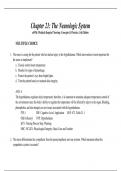Tentamen (uitwerkingen)
Chapter 21: The Neurologic System |deWit: Medical-Surgical Nursing: Concepts & Practice, 3rd Edition
- Vak
- Instelling
Chapter 21: The Neurologic System deWit: Medical-Surgical Nursing: Concepts & Practice, 3rd Edition
[Meer zien]




